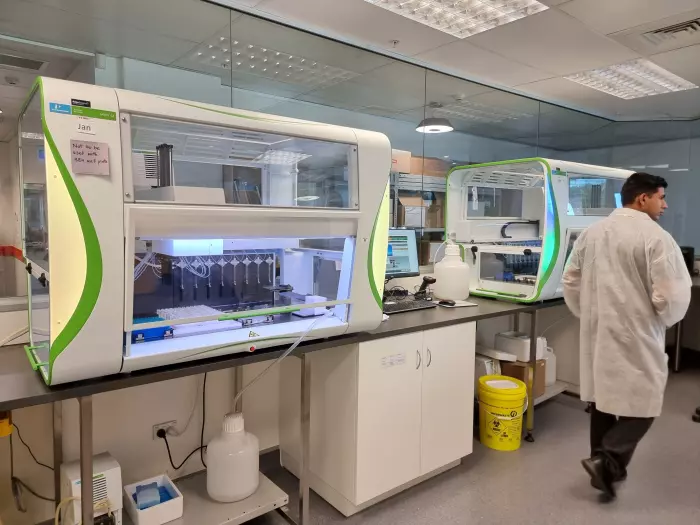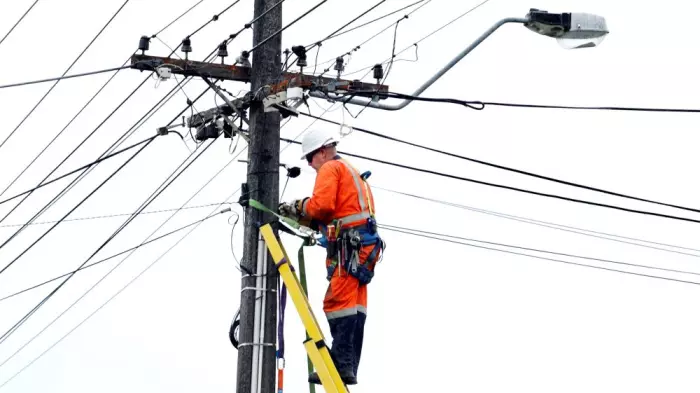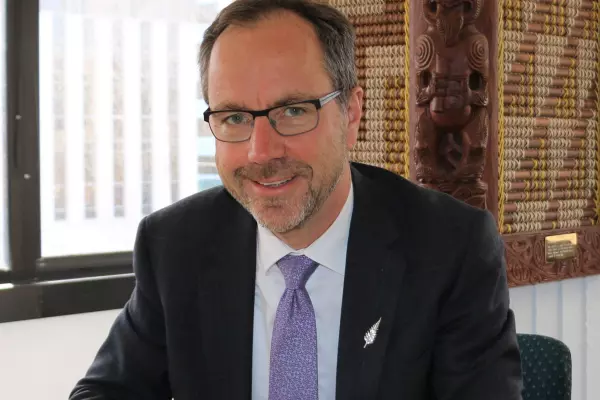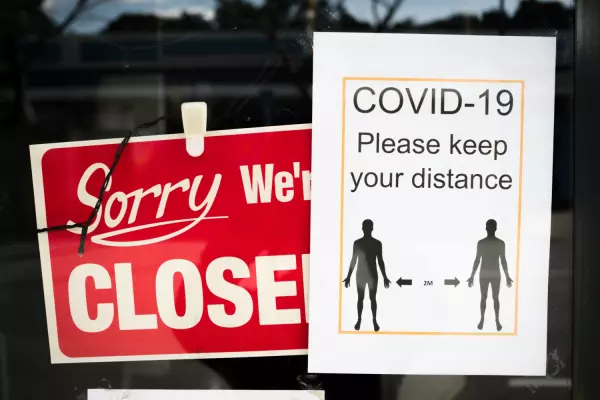Secrecy surrounds the effectiveness, method and validation of the covid-19 saliva test the health ministry is being forced, under political pressure, to implement nationwide.
Asia Pacific Healthcare Group (APHG), which was awarded the saliva test contract on May 26, will not discuss publicly detail of the saliva test it is using, whether the test is diagnostically validated, or a number of other questions put to it by BusinessDesk over the last week.
The firm’s saliva test, which the Ministry of Health had wanted in place by mid-April when it first sought bids for a contract it has indicated could be worth $50 million a year, is expected to become available in Christchurch in coming days with a national rollout occurring on a staged basis through July.
APHG says it has been conducting its saliva test on a small number of border and managed isolation workers since the start of the year, but has never published any information publicly on the test.
On Monday last week, APHG’s relationships manager Trevor English told BusinessDesk “our test is pretty much the same test as you would run for the nasopharyngeal test” – the nasal swab test currently treated by the ministry as the ‘gold standard’ and only officially accepted test for the presence of the virus.
English said APHG had compared the saliva test it was using with two others that are in use internationally – developed by Yale and Illinois universities in the US – “and we know our test performs better in our hands than those two”.
However, APHG is unwilling to provide transparency on that and other questions relating to a saliva testing regime the health ministry resisted until being instructed in February to implement one.
Last September’s so-called ‘Roche-Simpson’ review of the ministry’s response to the pandemic urged implementation of saliva testing as soon as practically possible, but the ministry’s scepticism about saliva testing saw it delay until receiving blunt instructions from the Beehive to do so, early this year.
Comfortable
On Friday last week, after repeated requests for a statement on what test APHG was using and whether it had been diagnostically validated in NZ, the company responded with a seven paragraph press statement dealing with neither of those issues.
“APHG is responsible for the technical and clinical oversight of the surveillance programme which is conducted by an experienced team of pathologists, scientists, and technical experts,” said the firm’s Melbourne-based chief executive, Anoop Singh, in the statement.
Asked for an answer on what level of sensitivity the APHG saliva test could produce, English responded: “We are comfortable with our response, our science and our capability. All our assays have been validated and assessed by IANZ. We have been running NP (nasopharyngeal) and saliva testing in NZ for some time.”
IANZ stands for International Accreditation NZ, the body which accredits laboratories for different types of scientific work.
Not created equal
Scientific opinion is rapidly developing on the effectiveness of saliva testing in light of a range of new testing technologies becoming available.
The University of Illinois test has been producing results scientists in NZ and offshore say is as accurate, if not moreso, than the so-called ‘brain stab’ nasopharyngeal (NP) test.
The test has been diagnostically validated and has been available in NZ from IANZ-accredited facilities since January this year from Auckland-based Rako Science and uses a materially different test to the Yale and other saliva test protocols in obtaining its results.
However, Rako’s tender bid was rejected without consultation by the health ministry, despite the fact the firm has been conducting saliva testing for a range of commercial clients since the beginning of the year.
Auckland International Airport and Air New Zealand have both been using the Rako test, with Air NZ especially keen to move away from NP testing for pilots and crew on international flights. Green Cross Health pharmacies offer the Rako test as a pre-departure test for people leaving the country.
Air crews fed up
In an interview earlier this month, Air NZ’s chief medical officer Ben Johnston welcomed APHG’s saliva testing being rolled out because of the impact NP testing is having on international air crew.
“Our aircrew have been having regular nasopharyngeal swabs for over a year now, with some having as many as three or four swabs in a two-week period.
“This is having a huge impact, they are rightly sick of it and we would love to see a saliva test that could lessen the burden on them.”
However, Johnston indicated the airline is seeking higher sensitivity tests than APHG is providing.
“Air NZ has a very strong interests in having highly sensitive testing available that is sensitive enough to replace nasopharyngeal testing,” said Johnston, who was a referee for Rako Science’s tender bid.
“While we are happy to see some progress, our main interest remains in that area (saliva testing that is as good or better than NP testing),” he said.
Low bar
Meanwhile, questions to the Ministry of Health and an examination of the tender documents suggest a low bar was set for the requirements of any saliva testing option chosen for implementation in NZ.
The ministry’s tender document specifies no required level of sensitivity or evidence a test had been approved or accredited in other jurisdictions.
While the Rako test has US Food and Drug Administration (FDA) approval, a tick from the FDA was not a requirement of the saliva test solution in NZ, the ministry said, while declining to discuss why it had turned down the Rako test, citing “commercial sensitivity”.
The ministry also acknowledged there had been potential conflicts of interest identified on the panel that assessed the tender bids, saying “independent probity advice” was sought and “confirmed that as long as no single panel member had the ability to make the sole decision the conflict was being appropriately managed”.
BusinessDesk’s inquiries suggest the ministry has been significantly influenced in its views about the effectiveness of saliva testing by the NZ Micro-Biology Network, an influential scientific group that advised against depending on saliva testing in a position statement on March 5.
“NZMN does not recommend the use of saliva as a diagnostic assay for testing of symptomatic patients or asymptomatic contacts of confirmed cases,” the March statement said.
However, its chair Susan Morpeth, told BusinessDesk in an email last week the network was “likely to review the saliva testing statement as more data become available, particularly local data”.
She noted the equivalent Australian body, the Public Health Laboratory Network, had issued an updated statement on saliva testing on June 10 that continued to recommend use of NP testing as the ‘gold standard’ and noting the low incidence of covid-19 infection in Australia made judgements about the reliability of saliva testing more difficult.
However, it said “saliva may be useful for screening purposes (when testing is repeated daily or every few days), where regular nasopharyngeal sampling is unacceptable”.
“Workers in quarantine settings are an example where saliva is used as part of a regular repeat testing surveillance mode.”
In its March statement, the NZMN said "any method of saliva testing would need local method validation”, using “at least 35 true paired saliva and NP samples”.
This is understood to have been a stumbling block for all would-be providers of saliva testing in NZ, as the health ministry has not been collecting and making available ‘true’ samples of covid-infected material to conduct tests with, despite ongoing discovery of covid-19 among people in managed isolation.
“Access to such samples is currently difficult in NZ and the use of simulated samples with inactivated cultured virus for the purposes of validation may not be representative of clinical samples,” it said.
APHG has not disclosed how its test has been validated or responded to requests on whether it meets such a standard.
In its tender application, Rako submitted it had established its saliva test’s sensitivity “by performing blind testing of paired covid-19 positive (n=33) and negative (n=119) saliva samples in triplicate” at laboratories at Victoria University of Wellington, Auckland-based diagnostic lab IGENZ where Rako’s test processing occurs, and at the University of Illinois.
“These samples showed 100% concordance between all three laboratories.”
Janet Pitman, an associate professor at Victoria’s school of biological sciences who undertook the testing for Rako in her laboratories, stated in February “this test is incredibly accurate”.
“It is similar if not better than the nasal swab test (NP).”














